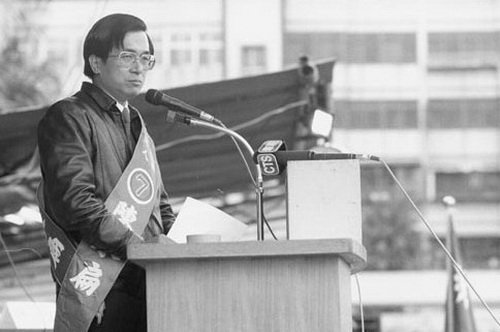by Brian Hioe
語言:
English
Photo Credit: VOA/CC
WITH THE SECOND DPP administration under Tsai Ing-Wen incoming, the question of Chen Sui-Bian, the first DPP president and the only previous non-KMT president in Taiwanese history, has once again become a political issue. Chen was arrested immediately after the end of his term in 2008, quite literally the hour that he left office and Ma Ying-Jeou took office, on charges of corruption and embezzlement. Chen was first sentenced to life in prison, which was later reduced to twenty years in prison. Chen had served six years of that term, during which Chen undertook hunger strikes and attempted suicide, before later being released on medical parole in January 2015 because of suffering diseases as neural degeneration, heart disorders, and sleep Apnea.
The arrest of Chen was one which was accepted by much of Taiwanese at the time, but with the declining popularity of the Ma administration, many question as to whether this was political retribution. The truth or falsehood of the charges against Chen remains a divisive manner, with some not being so convinced of the charges except as a political frame-up, while others still remain convinced of their truth. Chen, of course, still has his devoted supporters. Chen’s emergence as a political figure who eventually became Taiwan’s first non-KMT president is deeply bound up with the history of democratization, having been one of the defense lawyers for the Kaohsiung Eight during the 1979 Kaohsiung Incident.
 Chen giving a speech in 1989, while running for the Legislative Yuan. Photo credit: 孫敬儒的部落格
Chen giving a speech in 1989, while running for the Legislative Yuan. Photo credit: 孫敬儒的部落格
Likewise, the issue of Chen’s release on medical parole remains a divisive issue. For obvious reasons, Chen’s supporters and those who view the charges as a frame-up against him, are more supportive of his release on medical reasons. On the other hand, Chen’s detractors have, for example, accused Chen of faking his illness. On both sides of the divide about Chen, there are views that Chen’s release was politically motivated, with the KMT agreeing to release Chen as a way to deflect criticism.
These questions about Chen, however, have been raised again in recent times with not only renewed calls to pardon Chen but also an upcoming court summons. Chen is currently released on medical parole, with evaluations as to his health occurring every three months, and Chen’s parole has been extended six times now.
In particular, it is a question as to what Tsai Ing-Wen’s attitude will be towards Chen, seeing as public views of Chen are still divided. Some have called on Tsai to pardon Chen, but this would, of course, quite possibly be seen as the DPP acting to defend its own, in spite of any corruption on the part of Chen. This would put Tsai in a difficult position, particularly at a time in which Tsai is attempting to project the image of being beyond the partisan politics of the past and beyond party corruption. Recent polling has suggested that the majority of the Taiwanese public does not support pardoning Chen.
Others have called on Ma Ying-Jeou to pardon Chen in the interest of bipartisan politics, including Chen Chu, mayor of Kaohsiung and one of the Kaohsiung Eight. Ko Wen-Je, mayor of Taipei city, has also expressed that the issue is one best settled before the Tsai administration enters office, and that he would probably be visiting Chen very soon in his capacity as a physician.
Still others have suggested that Chen’s upcoming court summons on May 13th is politically motivated in nature on the part of the KMT, as possibly a last act of revenge by the outgoing Ma administration. Certainly, in recent times, the Ma administration has been undertaking a number of unexpected acts with large ramifications, such as his visits to disputed South China Seas territories, seemingly to suggest that he is not willing go into the good night where political power is concerned. The court summons involves the reopening of the charges into Chen’s corruption by Taiwan’s High Court. Many find it suspicious in timing that Chen’s medical parole was extended without question for the last year during each of the times Chen was reevaluated but the case against Chen is suddenly reopened right before Tsai Ing-Wen is about take office. The KMT Central Standing Committee has passed a motion against the notion of pardoning Chen.
Details will become clearer in time, when Chen’s court date arrives. Nevertheless, perhaps the general circumstances of the case—with questions of whether legal processes are being distorted in the name of retributive politics—only serves as a reminder that Taiwan is not exactly beyond its authoritarian past. Rather, while it is clear that Taiwan has made steps past authoritarianism, it is still opaque as to how beyond authoritarianism Taiwan truly is, with such questions about whether treatment of Chen by the legal system is politically motivated in nature. That the terrain of navigating beyond authoritarianism remains complicated is evident in questions of how Chen’s case should handled by the incoming Tsai administration.


 Chen giving a speech in 1989, while running for the Legislative Yuan. Photo credit: 孫敬儒的部落格
Chen giving a speech in 1989, while running for the Legislative Yuan. Photo credit: 孫敬儒的部落格